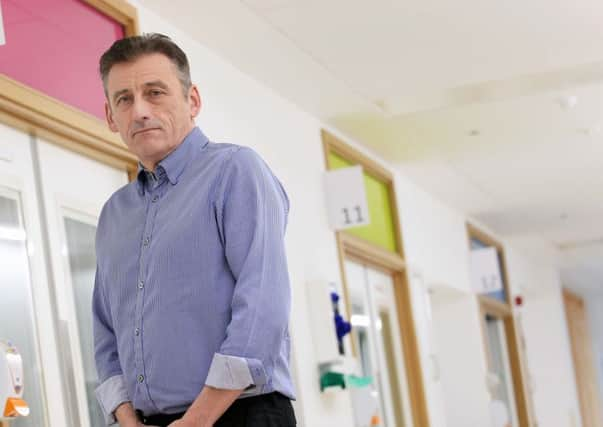Political interview: How three decades of caring for patients is helping Prof Des Breen shape healthcare in South Yorkshire


But it was only due to a pioneering coming together of clinicians from seven hospitals, plus NHS trusts, councils and the voluntary sector in Barnsley, Bassetlaw, Doncaster, Rotherham and Sheffield, under the umbrella of the South Yorkshire and Bassetlaw Integrated Care System (ICS), that this unified approach, which has already saved more than £2m, was made possible.
At the forefront of the ICS, one of just a handful in the country, is medical director Professor Des Breen.
Advertisement
Hide AdAdvertisement
Hide AdOriginally from Hull, he came to Sheffield as an anaesthetist in the 1980s after studying medicine in Nottingham and Lancaster.
Much of his life has been influenced by what he describes as “touch points”, moments of connection or snippets of conversation that have shaped his way of thinking. Growing up on a deprived estate, the kindness shown by his neighbours, such as the trawler man who would share out his quota of the day’s catch, or later, the physicians he met during his formative training years in Sheffield’s hospitals, including the “visionary and inspiring” Glynn Schroeder, the first person in Sheffield to set up an intensive care unit and Professor Walter Nimmo, who taught him that “you’ve got to be a good at your day job, otherwise you won’t have any credibility”, and helped him see that it was often the bigger picture that could affect not only how hospitals are run, but how patients are treated.
More recently, the experience of his 18-year-old son, visiting hospital wards as part his own journey to becoming a medic, has helped show him that he and his colleagues are on the right track.
“He jokingly said,’you should be out of a job, Dad’,” Prof Breen said. “What he witnessed, was that over half the patients on intensive care, could have been prevented further down the chain - complications with diabetes and obesity, heart attacks due to smoking. What he saw, was that if we did things better, higher up the ladder, we could make a difference. We have to strategically look at our priorities.”
Advertisement
Hide AdAdvertisement
Hide AdAll of these touch points, and 35 years of seeing patients at their most vulnerable, helps him to see the bigger picture when it comes to healthcare for the 1.5m people who live across South Yorkshire and Bassetlaw. He first began working in a strategic role in 2014 in the wake of the 2012 Care Act, when chief execs across South Yorkshire began coming together for the first time, at a period when hospitals were “set competing against each other”.
He said: “I’ve always wanted to contribute more than my clinical job. For me, it’s about seeing what you want to change, and rather than sitting back, taking action and making a difference.”
The ICS is a continuation of this approach, focusing of three things: keeping people well and preventative heath; reducing inequalities across the system, and doing things as efficiently as possible. Collaborative procurement just one example sitting alongside the likes of the transformations of how medical records are collated, and the way staff and hired and trained across South Yorkshire.
Prof Breen said: “It’s up to us as clinicians to make sure we use every penny of public money wisely. We started with collaborative procurement four years ago, and didn’t know what we could achieve. We had seven hospitals across 15 sites agreeing to collaborate. To build trust, we started with something less contentious, examination gloves. There was some nervousness but overnight we saved half a million pounds”.
Advertisement
Hide AdAdvertisement
Hide AdHe believes the ICS, which is not a legal entity and operates away from political pressure and targets, with clinicians at the helm, can help shape the future of the NHS.
“If we can demonstrate what works we can shape legislature regardless of the political landscape in the best interests of patients,” he said.
An unusual role, but still a clinician at heart
Still a working practising consultant anaesthetist, Professor Des Breen, is the medical director at South Yorkshire and Bassetlaw Integrated Care System.
Having practised in Sheffield for more than 25 years, he has the unusual role of getting clinicians from across the South Yorkshire and Bassetlaw to find and take the time to rethink some of the care being delivered to patients and how that could be improved by bringing services together – primary, secondary, third sector and social care, as well as improving the relationships that already exist.
Advertisement
Hide AdAdvertisement
Hide Ad“I still love my clinician job,” he said. “Working for so long, clinically based, is an absolute privilege - looking after people at their most vulnerable. Even now, when I’m talking to relatives, I still feel that water in the back of my eyes and that lump in my throat. But I’ve always wanted to contribute more than my clinical job. When you work clinically you can see what you want to make different.
“There’s often a misconception about what an anaesthetist does, We keep people alive, not keep people asleep.”